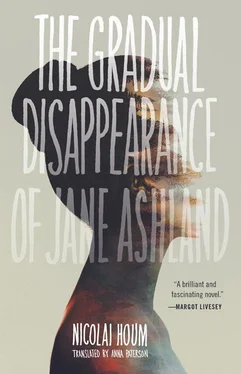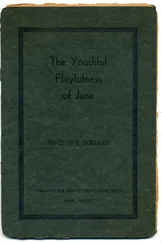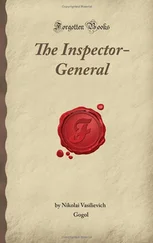“Oh.”
“Did the question sound stupid? Weekly magazine style?”
“Not at all, it’s fine. Julie and Greg are my life. The rest is fiction.”
TO SEE THEM.In the shop, the park, a playground, at a distance. A certain way of running, or how a child pushes her hair behind her ear. The same sweater. Listening for someone who isn’t there, who has disappeared. At night, in the house, in your head. The inexplicable physical pains, the burning feeling of clothes against your skin that makes you rip them all off and stand naked in the bedroom. Climbing over the cemetery fence in the middle of the night because it is not possible to wait until they unlock the gate in the morning. Feeling hostile to everyone who grows older, somehow undeservedly. Feeling hostile toward everyone who is alive, yourself as well. Screaming in the car—people passing you in the next lane think you’re singing!
Hating someone on TV who talks about grieving with dignity. Hating TV. Hating the word accept . Hating everything that carries on regardless, indefatigably. Hating all those who avoid you as if you were infectious. Hating all those who don’t avoid you but fail to understand. Hating the spring, the flowers that dare to flourish.
THINKING BACK, THEodd thing about creative writing studies was the fact that it was forbidden to write about pure accidents. She had instructed each new batch of expectant students: no accidents. Using literary power language that seemed odd in retrospect, she had used the phrase deus ex machina —God from outside the machine, a narrative trick that introduces an inconsequential or manufactured element into a story in order to solve a problem; an arbitrary turning point, unrelated to the traits of the characters and to the motivations you were meant to write about: pride, desire, egoism.
If students nonetheless produced pieces of writing where unexpected but fateful events occurred, she would explain that they had gotten stuck with the original storyline and picked a facile escape route, adding that, anyway, the solution was inherently unconvincing. Then she told them to write something different that would come across as more believable.
In other words, she wanted the students to write about an unreal world. Outside fiction, conditionality is a basic aspect of life. Generally, it is what people struggle with, at least when they are not fighting each other: If only I had more money… If I build this barrier tall enough… If I keep my head down and say the right things…
And then, with no permission, without respect or consideration, it hits you: the untreatable esophageal cancer, the fire in the fuse cupboard, the armed, methamphetamine-maddened burglar who rambled along to your open bedroom window rather than your neighbor’s, the winter blizzard that dumped tons of snow on the substandard roof of the sports arena.
Conditionality creates the irreducible gap between the world as you wish it to be and what it actually is: a place ill suited to creatures in search of meaning.
SHE LACES UPher boots. They have Vibram soles and a layered construction that provides insulation but is also uniquely breathable. You can’t possibly die if you wear them. She keeps the clothes in her rucksack but discards everything else. Including the water bottle, because it was so long since she felt thirsty. She tries to stop shivering and put the sleeping bag back into its cover, but it’s like trying to manipulate it with a fist of partly thawed fish fingers. Then, she stands in the icy rain and shakes and clings to one of the tent poles through the thin top sheet and won’t let go. The anorak hood is tied around her head and she can see a tuft of hair sticking out and dripping rain down her collar. Her breath smells of ammonia. She recognizes it from the anorexic girl she shared a desk with during biology class in high school.
She ought to have every qualification in the book for grasping what it would mean to Dorothy and Robert if she were to die here. But the thought of them mourning her is still irritating. Ulf was right. What gets to her is that her parents will regard their emotions as meaningful in ways that have no relationship whatsoever to the world she observes now, a world that, quite unknowingly, is about to kill her—the wind, the endless rocks, the air saturated with water molecules and reflecting light at a wavelength that the human eye perceives as white.
She counts to nine, closes her left eye, and nods politely to the stone, as one must in order to be safe when one passes it. Then she counts again, going down this time, and sets out with her neck bent. For each step she takes, new surroundings seem to be put in place, new shapes emerge out of the whiteness. Or, rather, more of the same. Unending ground-down stones on damp black peat, like a cobbled route unrolling in front of her.
Her idea was to work out a direction from the sky and walk straight ahead, but a compass was the one thing she didn’t buy before the hike. Always something, isn’t there? She is pretty sure that the sun rises in the east and sets in the west. Her watch tells her it’s eight o’clock, but it is a Seiko that winds itself when one’s arm swings, something her arm hasn’t done for several days. Greg gave it to her on her thirtieth birthday. She wonders if she shouldn’t take it off and leave it in some very visible place because it’s so valuable.
Once, she asked a student who enjoyed skydiving what it felt like to fall through a cloud. His answer disappointed her: he said there was no sudden transition between the cloud and the blue sky.
You’ve done roughly the same on the ground , he said. Just imagine wandering into a very low, very large fogbank .
If she tries to think like that, it also becomes possible to believe there is something outside the cloud. But it’s exhausting. She encounters some large boulders and has to walk around them. It is impossible to stick to a set direction.
She checks her watch. Now it says twelve o’clock but the brightest place is not right above her. Her steps create sodden echoes that make her look over her shoulder. She tries to speed up and walk more lightly but that’s worse still. There’s a sucking sound every time she lifts her heels. She can hear her own quick breathing while she wades through clumps of rushes that reach her hips. The water is seeping over the tops of her boots.
Then a mound appears some way away, a place where she can stand on dry ground. But she gets close to the mound faster than she expected and realizes that it is no more than a bump, just about large enough for the soles of two boots. She bends like a tightrope walker, and, suddenly, she sees a light ahead of her. A searchlight, a head lamp, perhaps the fluorescent glow of a rescue helicopter light. She splashes through the wet moorland, running toward the light that spreads and becomes stronger the closer she gets.
Just a few more steps and she sees it: it is the orange tent. A sentence comes to mind. She might have written it herself or perhaps read it somewhere or perhaps it has occurred to her at this moment.
There is a component of deprivation that is similar to starvation: a physical sensation of hollowness.
A WOMAN LOVESa man very much, he loves her very much, they cannot imagine life without each other, and, even though it is not said aloud or even clearly formulated in their thoughts, they take the fact that they have found each other and love each other and have created a good life together—the fact that love, after all, does exist—as proof that life as a whole has a hidden but beautiful pattern, that there is an inner order to the apparent chaos of the world around them, a lofty intention behind everything.
Читать дальше












